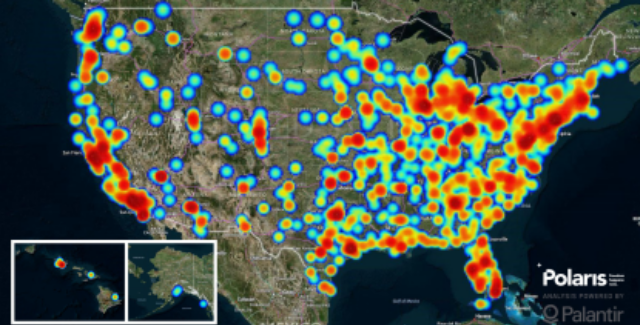Human trafficking is a massive worldwide problem, and that’s not excluding the United States, or the state of Colorado.
(COLORADO) – Polaris, the organization that runs the National Human Trafficking Hotline shared a map which showed numerous trafficking reports along the I-25 corridor through Colorado.

(Map reflects cases where location of the potential trafficking was known. Source: Polaris Project.org)
Last year alone, the Human Trafficking Hotline (HTH) received 592 calls from Colorado, which was the 11th highest call volume of any state in the U.S.
- From those tips, around 120 unique cases of trafficking were reported
- As of June 2017, the hotline reports 198 calls from within Colorado identifying almost 60 human trafficking cases. Twenty-six of those calls were from trafficking victims
- Here in Colorado Springs, over the past four years, the Colorado Springs Police Department’s human trafficking unit investigated 191 cases spanning prostitution, involuntary service, and commercial sex acts
- Those nearly 200 cases resulted in 127 arrests and the identification of 47 human trafficking victims
To put those numbers into context, there are three things you should remember about those statistics.
- The numbers do not represent every single case of human trafficking that occurred in that time frame. According to organizations fighting it, the issue is widely under-reported.
- According to Polaris, the number of reports is increasing each year. Reports of trafficking are up nationally 35 percent from 2015.
- Experts also say this increase doesn’t only represent the expansion of this criminal market. They said increased awareness, more education and increased efforts to fight the problem could be contributing to the rise in reported cases
Significant efforts are being made to educate people living in Colorado about how to recognize human trafficking.
Truckers Against Trafficking (TAT) is based in Englewood, Colorado, which describes itself as an organization that wants to turn America’s commercial driving force into an investigative army to recognize and report human trafficking.
“[Truckers] are a critical audience that needs to be trained around this issue, so they know how to recognize and report this crime. So we work with every segment of the trucking industry, as well as law enforcement and government agencies in order to really create a mobile army, to hopefully assist victims and arrest traffickers and buyers,” commented Kendis Paris, Founder of Truckers Against Trafficking.
Since the birth of the non-profit, TAT reports more than 500,000 truckers have been educated to look for cases of human trafficking. The group said that’s resulted in nearly 2,000 calls from truckers being made to the National Human Trafficking Hotline. Those calls have identified 545 likely trafficking cases involving more than 1,000 victims, 315 of which were minors.
Here in Colorado, the Department of Revenue hands out a wallet-sized info card from Truckers Against Trafficking with each CDL renewal. If TAT and the Colorado Human Trafficking Council have their way, each new CDL licensee will undergo trafficking recognition training before being licensed.
The group said the training will not cost trucking companies and each training session takes 30 minutes.
“So before they ever hit those roads, they understand this issue, and recognize forced prostitution, in particular, is something that they may come into contact with. So how can they play a role in helping to change a person’s life?” Paris said.
The proposal to train truck drivers is being put before the Colorado state legislature in early 2018. If the proposal is passed, it could mean hundreds of new eyes and ears on the road in the years to come watching out for signs of trafficking.
Truckers Against Trafficking isn’t the only group trying to get lawmakers to pass new bills aimed at combating human trafficking.
The Colorado Human Trafficking Council is asking for more trafficking recognition training in rural areas of Colorado. It is also asking for more legal protection for children who were forced into illegal activity as a part of trafficking.
In addition to advocating for new laws, the council is also planning to launch an education program for law enforcement officers. Already there are law enforcement volunteers willing to be trained and in turn train their departments.
In Colorado Springs, the Human Trafficking Task Force of Southern Colorado is working to integrate trafficking education into public schools’ curriculum.
The group said it believes there should be an understanding of this issue at a young age. So far, the task force reports that many public schools are open to the idea.
Links for additional information :
- Trafficking in Persons Report: June 2017
- Colorado Human Trafficking Council
- National Human Trafficking Hotline’s Colorado Numbers
- Polaris: Freedom Happens Now
- Common Myths and Misconceptions Regarding Human Trafficking
- Human Trafficking 101
- Truckers Against Trafficking
- TAT Report
- Colorado Human Trafficking Council Report
- Human Trafficking Task Force of Southern Colorado
- United States Department of Labor
- Attorney General Speaking Against Trafficking

